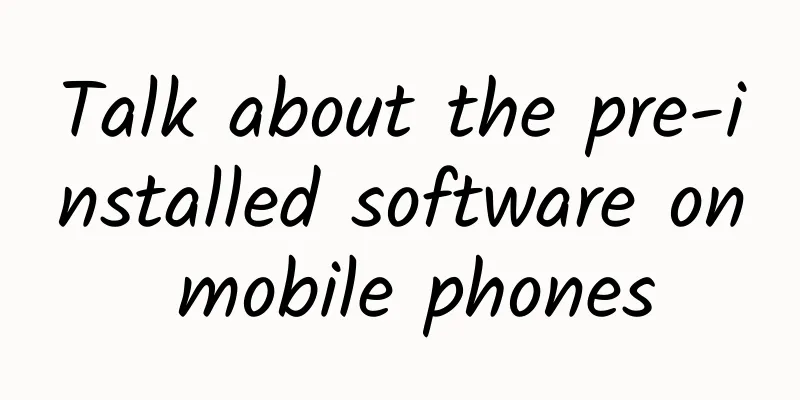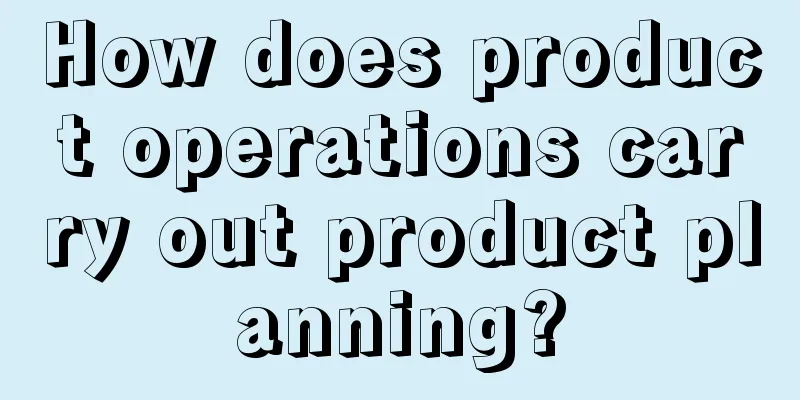Talk about the pre-installed software on mobile phones

|
CCTV has started to crack down on pre-installed apps on mobile phones. This is a good thing. Nowadays, many apps are often pre-installed on mobile phones. Some apps cannot be uninstalled and become very slow after a while. I believe everyone has some feelings about this. However, CCTV reporters calculated that each person has to spend an extra 60 yuan per month on data traffic for pre-installed apps. This is not common sense and is nonsense. The average monthly expenditure of Chinese users is not even this much for China Telecom and China Unicom, and China Mobile is just above this amount. It is a good thing to focus on the issue, but don't exaggerate. Exaggerating too much is actually fake news. Okay, let’s talk about these things that are pre-installed on mobile phones. Should smartphones come with pre-installed apps? 1. Mobile phones must have pre-installed software. When it comes to pre-installed software, some people start to go to extremes, saying that it cannot be pre-installed, it cannot be pre-installed, and if it is not pre-installed, can it still be called a smartphone? Apple's new phones are generally not pre-installed. I think Samsung has the most and most annoying pre-installed software. Pre-installation should be the most basic applications. For example, phone book, text messages, contacts, camera, and app store. I think it is understandable to pre-install some system and core-related applications, such as file management, power management, security applications, and even targeted payment applications. If these cannot be pre-installed at all, it will greatly increase the cost of use, confuse some novice users, and make it more troublesome to use. Pre-installation is a service. You can't just say that pre-installation is a must. 2. Can pre-installed applications be uninstalled? Similarly, some pre-installed applications cannot be uninstalled, because some applications need to manage the system and provide basic support. For example, phone calls and text messages generally cannot be uninstalled. I don’t think it is necessary to support the uninstallation of such applications. However, there were no regulations or determinations on which applications can be pre-installed and which applications can be uninstalled after being pre-installed. Of course, it is the manufacturer's choice to install as many applications as possible and not allow you to uninstall them as much as possible. The advantage is that you can collect money from third-party partners. Another advantage is that after using your mobile phone for half a year, it is too slow to use and you have to change to a new phone. Therefore, today, it is necessary to jointly formulate basic standards and requirements through government management departments or industry organizations so that applications in mobile phones cannot be pre-installed casually. There must be a reason for installation, and there must be certain requirements for quantity and features. In this way, there can be some restrictions without going too far. The profit chain of pre-installed applications I have mentioned some things that should be installed and some things that should not be installed. Here are the problems: 1. What should not be installed is a large number of applications installed on the phone, some of which are not necessary for users. This is mainly because there are too many applications, and secondly, users do not need them. The main reason why manufacturers do this is to make profits. These applications are generally divided into several categories: those developed by the manufacturer itself; those required to be installed by telecom operators; and those installed by charging third parties, which is to help third parties promote them. Therefore, there is a difference between those that can be uninstalled and those that cannot be uninstalled. Those that can be uninstalled charge less money, while those that cannot be uninstalled charge more money. In order to make more profits, some manufacturers ignore the user experience and install a large number of various applications. Some applications even start up as soon as the phone is turned on, occupy memory, and are in working state. This greatly affects the memory usage of the phone, reduces the speed of the phone, and also affects the user experience. There is a high possibility that such applications "steal" traffic. 2. Who pre-installs apps? When we say pre-installed apps, it’s not just the mobile phone manufacturers who are doing this. Who are doing this? First of all, the mobile phone manufacturers. In addition, there are telecom operators who can install their own apps in customized products. Mobile phone wholesalers, who have a large number of mobile phones in their hands, also make money. Mobile phone retailers are all plucking feathers from passing geese, installing a batch of apps to make money. So when you buy a mobile phone with a bunch of apps, you can blame the manufacturer, but not everything is done by the manufacturer. Of course, if the app cannot be uninstalled, it must be the manufacturer who did it. How can we facilitate user experience without harming user interests? It is not okay to kill pre-installed users, but it is also not right to allow them to proliferate. Is there a way to give users the right to choose, but at the same time not pre-install a large number of applications, which will affect the user's use and experience? I think "quasi-pre-installation" is a good choice. The so-called "quasi-pre-installation" is to package and categorize some built-in applications, such as: "System Management", "Utilities", "Life Services", "Game Entertainment", "Video", etc. These categories and applications are often needed by users, but these applications are not really installed in the phone, nor can they be used immediately. When the user really needs it, for example, I need to use navigation immediately, I can go to the app store to find it myself, or I can find a navigation software in the "Travel Navigation" category. When I click on it, I don't start using it immediately, but download the application and install it immediately. This is when the user needs it and then decides whether I need it or not, and whether I install it or not. Of course, this type of user-installed application can be uninstalled at any time. ***, regarding the lawsuits on application installation, I think it is very troublesome, because it is difficult to find provisions in existing laws and regulations that prohibit installation, and it is even more difficult to stipulate how many applications are reasonably installed. This requires the introduction of management measures as soon as possible. |
<<: Tutorials can make or break a game: A brief analysis of the design of a tutorial for new players
>>: Is Android becoming the new Windows?
Recommend
Android 12 simplifies the power menu function options, causing dissatisfaction among many test users
Google announced the new version of Android 12 mo...
Can’t tell the difference between information flow advertising, DSP, ad networks and SEM?
Many people don’t know the differences between in...
How much does it cost to be an agent of the Hebi Ticketing Mini Program? What is the quote for Hebi Ticketing Mini Program agent?
How much does it cost to be an agent for a ticket...
9.69 million RMB! A collectible Apple 1 computer for sale, which Jobs helped make 45 years ago
This article is reproduced from Leiphone.com. If ...
How to write good copy? Learn these 17 methods!
1. First you need to digest the information about...
A Xing 182th Guarantee Project: Xiaobai Project can earn 300 yuan per day and can work part-time [official price 3500 yuan]
A Xing 182th Guarantee Project: Xiaobai Project c...
How to do foreign trade promotion: Google bidding promotion or Google optimization?
From the moment you decide to do Google foreign t...
How to quote for SEO website ranking optimization plan?
For SEO website optimization personnel (newbies),...
Countless shots, just to create a perfect memory
Memories are irreplaceable. Money can buy a new T...
Are the materials submitted for information flow advertising repeatedly rejected? You haven't learned this internal audit rule yet!
With the 19th National Congress of the Communist ...
Three key points for event operation: How to increase users’ willingness to participate in events?
As an event operator , I wonder if you have ever ...
Liu Yimiao's lecture video collection
: : : : : : : : : : : : : : :...
How about Minsheng Life Insurance: What challenges do you often encounter as an SEO optimizer?
When you are in the search industry for a long ti...
How do new media operators choose promotion channels?
Recently, I saw a very thought-provoking question...
Understand the promotion path of social + games in three minutes
Recently, two major domestic Internet giants anno...









